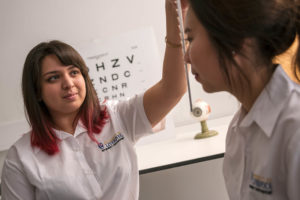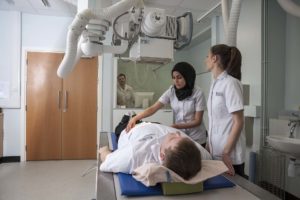About this course
Data science is transforming healthcare, where vast amounts of health data has the potential to revolutionise healthcare interventions. Gain cutting-edge research skills in this interdisciplinary area and delve into a year long research project tackling global health challenges. This programme will prepare you to be a key player in the digital revolution of healthcare.
Introduction
Please note, this programme is currently undergoing revalidation as part of our Curriculum 2027 review and may be subject to changes.
This MRes is the ideal choice for those looking to drive innovation in healthcare through advanced research. With the increasing availability of complex health data—from electronic health records to AI-driven diagnostics—there is a growing need for experts who can harness this information to improve patient outcomes and public health. This programme provides a unique opportunity to develop specialist skills in machine learning, predictive analytics, and data visualisation while conducting an extended research project that tackles real-world healthcare challenges. Whether you aim to pursue a PhD, contribute to cutting-edge medical research, or shape the future of health technology, an MRes in Data Science for Health equips you with the analytical expertise and hands-on experience to make a meaningful impact in this rapidly evolving field.
With the rise of electronic health records, wearable technology, and AI-driven diagnostics, healthcare now generates more data than ever before. Effectively analysing this data allows for earlier disease detection, personalised treatment plans, and more efficient resource allocation. The programme blends core principles of computer science with advanced statistical analysis and data visualisation techniques, demonstrating how health data science can enhance our understanding of disease and healthcare.
The programme is split into a 120 credit research project and 60 credits of specialised taught modules. Students are able to choose a project that appeals to their interests and work alongside internationally recognised scientists gaining hands on experience in state of the art techniques. The opportunity to undertake specialist taught modules will compliment this research, allowing students to delve deeper into prediction modelling, precision medicine and clinical trials.
This MRes also has strong links to the Civic Health Innovation Labs (CHIL), an internationally recognised, multi- and trans-disciplinary research centre based at the University of Liverpool. CHIL brings together leading experts from academia, the NHS, local government, charities, and industry to develop responsible AI and innovative data solutions for health and society. Students have the opportunity to engage in research projects focused on healthcare data analytics, digital health solutions, public health informatics, and the application of technology in community health initiatives.
Who is this course for?
This Masters programme is suitable for you if you hold a 2.2 degree from a UK University (or equivalent). Your first degree could be in any subject as this programme will train you in basic statistical and computing skills.
For overseas students an acceptable English Language qualification is required of IELTS 6.5 or equivalent with no individual band less than 6.0.
For Students who would prefer a larger taught component to their degree, we have two MSc courses in Data Science for Health:
If you have previous experience or quantitative training (for example a first degree in computer science or mathematics), please see our MSc Data Science and Analytics for Health, https://www.liverpool.ac.uk/courses/health-data-science-msc#about-this-course
For Students who do not have any previous experience or quantitative training, please see our MSc Data Science for Health (conversion), https://www.liverpool.ac.uk/courses/data-science-for-health-conversion-msc which is specifically designed for students who are wishing to move into the field of data science irrespective of their background and previous training.








